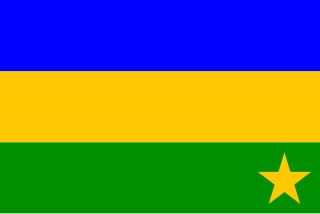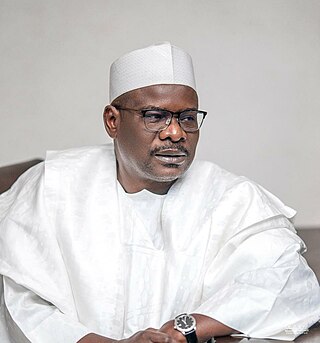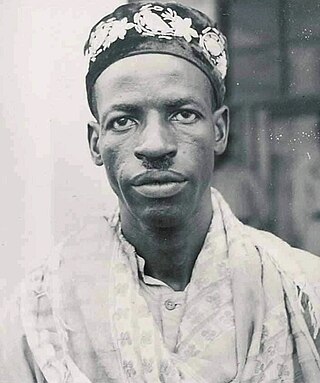Related Research Articles

The Kanuri people are an African ethnic group living largely in the lands of the former Kanem and Bornu Empires in Niger, Nigeria, Chad, and Cameroon, as well as a diaspora community residing in Sudan. Those generally termed Kanuri include several subgroups and dialect groups, some of whom identify as distinct from the Kanuri. Most trace their origins to ruling lineages of the medieval Kanem–Bornu Empire, and its client states or provinces. In contrast to the neighboring Toubou or Zaghawa pastoralists, Kanuri groups have traditionally been sedentary, engaging in farming, fishing the Chad Basin, trade, and salt processing.

Ali Modu Sheriff is a Nigerian politician who served as governor of Borno State from 2003 to 2011. He was the first governor to serve two consecutive terms.
Borno may refer to:
Alhaji (Dr) Mamman Shata MON was a Nigerian singer.

The First Republic was the republican government of Nigeria between 1963 and 1966 governed by the first republican constitution. The country's government was based on a federal form of the Westminster system. The period between 1 October 1960, when the country gained its independence and 15 January 1966, when the first military coup d’état took place, is also generally referred to as the First Republic. The first Republic of Nigeria was ruled by different leaders representing their regions as premiers in a federation during this period.
The Great Nigeria People's Party was one of the six major political parties that fielded candidates for elections in the Nigerian Second Republic. The party was formed by a splinter group from the Nigerian People's Party, the group was led by Waziri Ibrahim, a politician and businessman from Borno. Waziri was one of the leaders of the three associations that formed the nucleus of NPP. The original intention of NPP was to transcend the politics of ethnicity and to promote the cause of both the prominent ethnic groups and ethnic minorities. However, the entry of Nnamdi Azikiwe to NPP led to a power struggle in which Waziri lost. Waziri then led a group of minorities in the north and some southerners to form the Great Nigeria Peoples Party.

Alhadji Waziri Kolo Ibrahim was a Kanuri business man from Borno State, Nigeria, who became a prominent politician and party leader during the Nigerian Second Republic. He was one of the original founders and financiers of the Nigerian People's Party, but in 1978 left the party to form the Great Nigeria People's Party (GNPP). As a candidate of the GNPP, he won almost 10% of the national vote in the Nigerian presidential elections of 1979.

Mallam Aminu Kano was a Nigerian radical opposition political leader, teacher, poet, playwright, and trade unionist from Kano. He played an active role during the transition from British colonial rule to independence, the First Republic, Military rule, and the Second Republic. Representing the Kano East constituency, he served as the Deputy Government Chief Whip in the Federal House of Representatives. During Yakubu Gowon's administration, he served as the Federal Commissioner for Communications and the Federal Commissioner for Health. He was a vocal critic of British colonialism and its indirect rule policy in northern Nigeria. A self-described democratic humanist and reformer, Aminu combined his knowledge of Western and Islamic education to champion the liberation of the talakawa (commoners).

Ibrahim Imam was a Nigerian politician from Borno, who was the secretary of the Northern People's Congress and later became a patron of the Borno Youth Movement. He was elected into the Northern House of Assembly in 1961, representing a Tiv district. Prior to his election in 1961, he had represented his district of Yerwa in 1951 after supporting a strike of Native Administration workers.

Alhaji Muhammadu Dikko Yusufu, also known as MD Yusufu or MD Yusuf was a Nigerian policeman, Inspector General of the Nigerian Police Force, public servant and politician. Yusufu attended Higher Education at the Institute of Administration, Zaria in 1954 and University of Oxford where he was trained as administrative officer. Yusufu was the great grandson of Sarkin Katsina Muhammadu Dikko.
Kashim Ibrahim-Imam was born 8 May 1962, he is a Nigerian politician who was twice the People's Democratic Party (PDP) candidate for Governor of Borno State in 2003 and 2007, losing both times to the All Nigeria Peoples Party (ANPP) candidate Ali Modu Sheriff.
Khalifa Ahmed Zanna was a Nigerian politician who was elected Senator for Borno Central, in Borno State, in the 9 April 2011 national elections at the age of 55. He was elected under the People's Democratic Party (Nigeria) and was re-elected 2015 but died on 16 May 2015, few days before resuming office.

Mohammed Ali Ndume is a Nigerian politician who has served as the senator representing Borno South senatorial district since 2011. He was a member of the House of Representatives of Nigeria from 2003 to 2011. He is currently a member of the All Progressives Congress.

The Northern Elements Progressive Union (NEPU) was the first political party in Northern Nigeria. Founded in Kano on 8 August 1950, it was the offshoot of a pre-existing political association called the Northern Elements Progressive Association. It became the main opposition party in Northern Nigeria after the region was granted self-governance in the 1950s. In the First Republic it maintained a steady alliance with Zikist National Council of Nigeria and the Cameroons (NCNC) against the Northern People's Congress (NPC)-dominated Federal Government.
Alhaji Tanko Yakasai OFR is a Nigerian politician, human rights activist and former Liaison Officer to President Shehu Shagari. He is a founding member of Arewa Consultative Forum.

Ibrahim Ibn Saleh al-Hussaini, also known as Shaykh Sharif Saleh, is a Nigerian Islamic scholar, teacher and mufassir. He is the grand Imam of the Federal Republic of Nigeria he established annahda college of science and Islamic studies in the year 1957 and he is currently the head of the Supreme Council for Fatwa and Islamic Affairs in Nigeria (NSCIA).

Mallam Sa'adu Zungur was a Nigerian revolutionary, poet, jurist and nationalist who played an important role in Nigeria's independence movement particularly in Northern Nigeria. He is generally regarded as the father of 'radical politics' in Northern Nigeria. Zungur's political writings criticising the colonial government of Northern Nigeria, especially the emirate system, helped in laying the foundation for the principle of self-determination in Nigeria. His literary and political endeavors influenced a number of the leaders of the independence movement in Northern Nigeria, notably Aminu Kano and Isa Wali.
The 2007 Borno State gubernatorial election was the 6th gubernatorial election of Borno State. Held on April 14, 2011, the All Nigeria Peoples Party nominee Ali Modu Sheriff won the election, defeating Kashim Ibrahim-Imam of the People's Democratic Party.
The 2023 Borno State gubernatorial election took place on 18 March 2023, to elect the Governor of Borno State, concurrent with elections to the Borno State House of Assembly as well as twenty-seven other gubernatorial elections and elections to all other state houses of assembly. The election—which was postponed from its original 11 March date—was held three weeks after the presidential election and National Assembly elections. Incumbent APC Governor Babagana Umara Zulum has been renominated by his party.
References
- K. W. J. Post; The Nigerian Federal Election of 1959: Politics and Administration in a Developing Political System, Oxford University Press, 1963